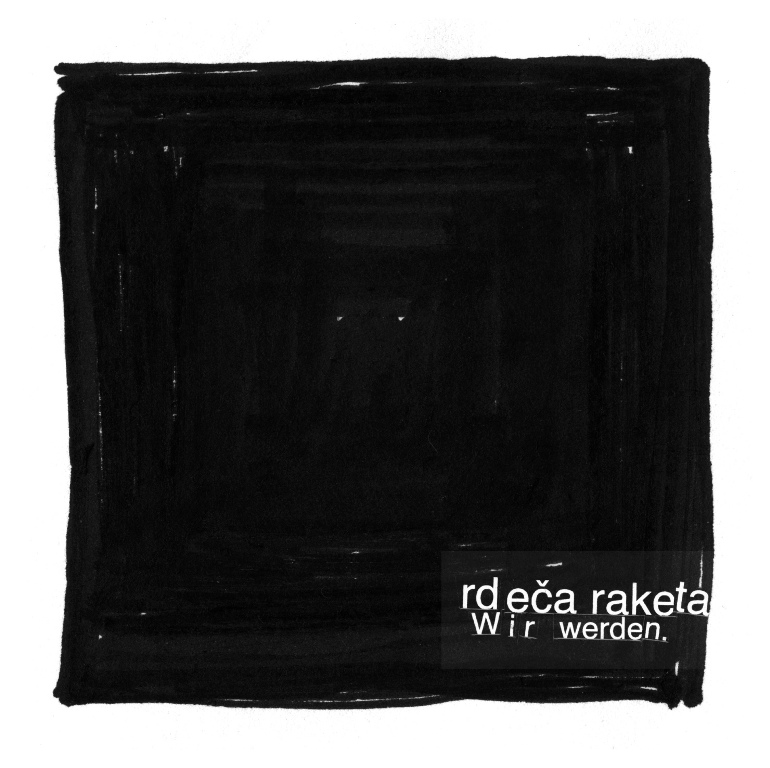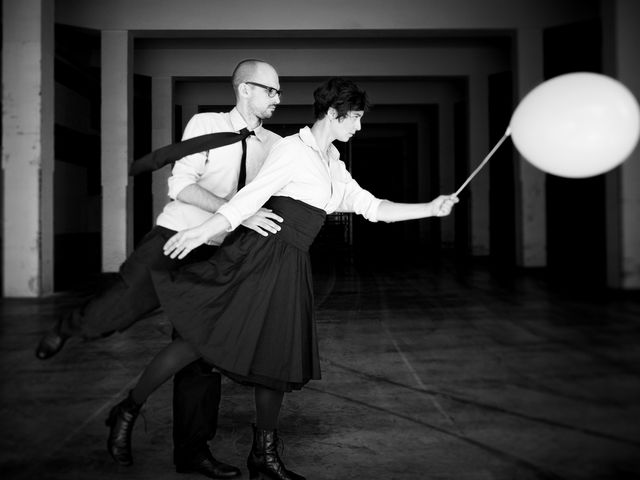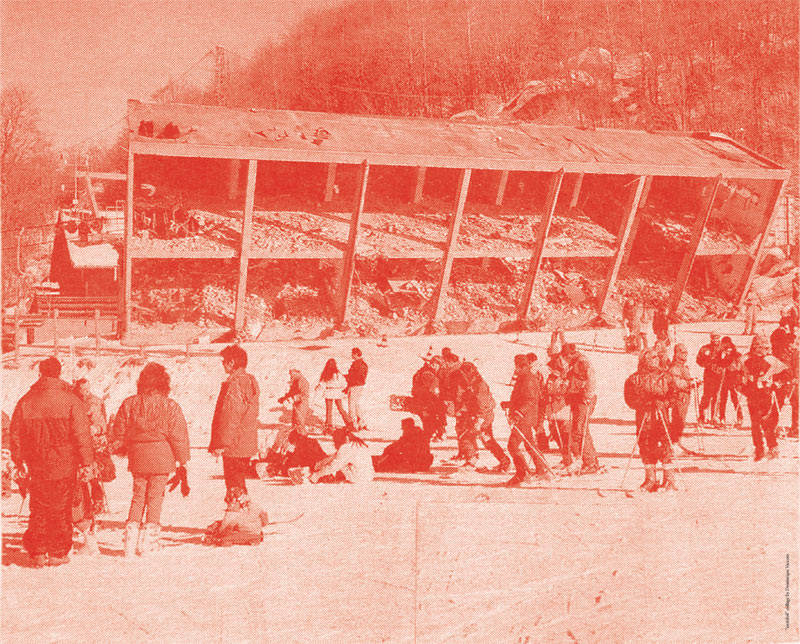Rdeča Raketa
Wir werden
LP

Maja Osojnik, voice, piano, tape machines, electronics, composition
Matija Schellander, double bass, e - bass, modular synthesizer, composition
Anat Stainberg, Lisa Kortschak, Max Gaier, speakers

by zoe fotografie
Collecting their experiences through various impro- and electro - acoustic projects, as a part of viennese circle, this Slovenia - born duo (Rdeča Raketa - Red Rocket), manifests their own post - apocalyptic vision of today's humanity.
Wir werden (We will), consists of two carefully composed pieces, each spanning on one side of vinyl. Constructed from various electronic sound sources and field recordings with acoustic instrments, duo offers brutal sine-wave attacks, discreet loops, scary drones and beautiful piano passages. And this is just small part from what this fabolous catalog of human's habits offers, opened and closed with the spoken word lyrics.
Wir werden deals with the past repeating, movements and their absence in front of systems appearing to be crumbling, relationships between people and their inner fears, as they claim themselves.
.
Ultimately, this release is collection of recommendations for surviving today's Brave New World.
.
Burkhard Stangl
Aporie und Zuversicht
(über Wir werden von rdeča raketa)
.....
"Gerne
würde ich den Menschen gute, schöne Worte sagen, helle Worte, hell wie
die
Novembersonne im Karst. Doch mein Wort ist schwer und schweigsam,
bitter wie
die Wacholderbeere vom Karst. In ihm ist ein Leid, von dem ihr kein
Wissen
habt, und ein Schmerz, den ihr nicht kennen könnt. Mein Schmerz ist
stolz und
verschwiegen, und besser als die Menschen verstehen ihn die Föhren und
Wacholdersträucher auf der Karstweide." Der Verfasser dieser Zeilen -
dem
Vorwort seines posthum erschienenen Lyrikbands Pesmi
(Gedichte) entnommen - ist der slowenische Lyriker Srečko
Kosovel (1904-1926), dessen Gedicht rdeča
raketa dem Duo Maja Osojnik/Matija Schellander seinen Namen
gab: Jaz
sem
rdeča raketa, vžigam se in gorim in ugašam / Ich bin eine rote Rakete,
ich
entzünde mich, brenne, verlösche. Der Hauptvertreter des
slowenischen
Expressionismus und Konstruktivismus, Galionsfigur der slowenischen
Avantgarde,
der frühreife, brillante Kosovel gilt als das genialste
lyrisch-philosophische
Talent der slowenischen Moderne, ein slowenischer Rimbaud. Sieh doch, ich ganz in Rot! / Sieh doch, ich mit
dem roten Herz! / Sieh
doch, ich mit dem roten Blut! / Unermüdlich renne ich, als müsste ich
selbst
mich vollenden.
Zuerst
der Name. Dann die Musik. Dann der Text. Dann die Fotografie. Dann die
Sprache.
Dann die Landschaft, der Karst und das Meer. Dann Kranj, Bilčovs,
Ljubljana, Wien. Dann die
Politik. Dann die Aktion. Nein! Das „Dann“ gibt es nicht bei rdeča raketa.
Alles ist da, man kann es spüren, später weiß man es:
Verlust, Krise, Krieg, Drohung, Wut, Kampf, Zerstörung, Dystopie,
Traurigkeit,
Fragmentiertheit des Lebens, Utopie auch, das Robuste, das Leise und
das
Innige.
Die
LP Wir
werden ist pure Musik: sanft, kraftvoll, bedrohlich,
obsessiv,
präzise, unbeirrt, unverhüllt, schamlos. Sie beschwört
eine fein- und
tiefsinnige, zugleich verzweifelte Poesie herauf. Wir werden
erzählt von einer
gebrochenen Zeit - in der Vergangenheit genauso wie in der Gegenwart.
Zentrales
musikalisches Stilmittel ist die Verfremdung, die Neudeutung des
akustischen
Materials. Damit wir das Fremde und Befremdliche nicht überhören? Rdeča
raketa löst Kosovels Forderung ein, der Künstler möge den
"genauesten Ausdruck eines vollständigen Erlebnisses finden, das durch
diese organische Gestalt unmittelbar wirke.“
Die kunstvolle Verwebung von gesprochener Sprache
(basierend auf Osojniks Texten), analog-elektronischer und digitaler
Klanggenerierung (Synthesizers, Computer), subtil eingesetzten Samples
und
Fieldrecordings sowie von akustischen Instrumenten samt elaborierter
Klangprozessierung (Bassblockflöten-Haucher, Stimmen-Stöhnen,
hundertfache
Schichtung von Kontrabasstönen, verstimmtes Hochkulturklavier im Normal
und
Reverse-Modus) stellt sich als eine wundersam
heterogene Mischung dar, die - zu einem unteilbaren Ganzen verdichtet -
weit
über das Feld der Musik hinausweist.
Man
betrachtet das Cover der LP und wird unmittelbar an Kasimir
Malewitschs Schwarzes Quadrat aus
1913/15 erinnert. (Genau zu dieser Zeit begann der junge Kosovel mit
seinen
ersten Schreibversuchen). Das Cover erinnert auch an die slowenische
Musik- und
Künstlergruppe Laibach, die bei
ihrem
ersten multimedialen Projekt Rdeči
revirji (‚Rote Reviere‘) - im Voraus von der jugoslawischen
Regierung
verboten -, auf den Werbeplakaten Malewitschs Bild Schwarzes
Kreuz verwendet hatte. Auch wenn nicht im Zentrum, so
stellen die provokativen, polarisierenden Arbeiten von Laibach,
sowohl was den politischen Aspekt als auch die innovative
Arbeitsweise betrifft (z.B. den ganz frühen radikalen Einsatz von
Sampling),
einen nicht unwesentlichen Einfluss auf rdeča
raketa dar. Auch die
Schriftzüge
auf dem Wir werden-Cover changieren
mit der Aura alter Medien der Moderne. Die an konkrete
Poesie gemahnende verwackelte Schreibmaschinen-Typografie
findet ihre akustische Analogie im Bandrauschen einer Tonbandmaschine,
das man
über die ganze Laufzeit der Platte, zumeist an der unteren Hörschwelle
entlang,
wahrnehmen kann: das Rauschen des 20. Jahrhunderts. Weiters ist der LP
eine
Fotoarbeit des italienischen Klang- und bildenden Künstlers Dominique
Vaccaro
beigelegt. In eine ruhige Skipistenidylle ist als Hintergrund ein in
Stahlbeton-Skelettbauweise errichteter, nun komplett devastierter
Wohnblock
montiert, der wie ein fürchterlicher Rachen mit verfaulten spitzen
Zähnen
erscheint, im Begriff, die friedfertigen Urlauber aufzufressen. Die
Fotografie
ist rot eingefärbt. Und
je mehr ich renne, umso
mehr brenne ich. / Und je mehr ich brenne, umso mehr leide ich, / und
je mehr
ich leide, umso schneller verlösche ich. / Ja, ich, der ich
gern ewig
lebte. Und ich, / der rote Mensch, gehe über ein grünes Feld, / im
blauen See
aus Stille über mir / sind eherne Wolken, o, und ich gehe, / ich gehe,
der rote
Mensch! (Kosovel:
Rdeča raketa).
Das
Duo rdeča
raketa bleibt auf der LP ungesehen, kein Portrait ziert das
Cover. Fotos
von Osojnik/Schellander finden sich im Internet – und sie sind allesamt
aufwendig inszeniert. Sie sind Lichtbilder aus einer anderen Zeit,
beruhigend
unmodisch. Maja Osojnik könnte Tina Modotti sein, Matija Schellander
Yves
Klein. Ein fiktives Paar, das eine gemeinsame Geschichte hat. Dieser
fotografische Benjaminsche „Tigersprung in die Vergangenheit“
kontextualisiert
das kulturelle Gedächtnis mit dem aktuell Zeitgenössischen. Was für
diese
inszenierte Fotografie gilt, gilt genauso für Arbeit von rdeča
raketa insgesamt: Sie lässt ein Bewusstsein von einem
Geschichtskontinuum entstehen, das die Gedanken an all die politischen
Scherbenhaufen, gesamtgesellschaftlichen Desaster und verratenen
individuellen
Möglichkeiten neu dynamisiert. Wir werden
spricht von temporären Heimaten und Unbehaustheit, es gibt keine
sichere Bleibe
mehr. „Das befestigte Haus ist wirklich fest nur durch die Hoffnung, es
lebend
zu verlassen“ (Paul Virilio). Ein Leben zwischen Aporie und Zuversicht:
Wir werden die leeren Räume mit Bedauern
erfüllen, die Einsamkeit ausbluten und werden von den leisen Absichten
gestillt, heißt es in Osojniks Poem. Rdeča
raketa forscht der Geborgenheit in der Kunst nach, bemächtigt
sich der
Sprachlosigkeit, um wieder Sprechen zu können und frägt: „Leben wir in einem sich
aufbauenden System oder in einem in sich zusammenfallenden System? Erscheint
die Gesellschaft heute
nicht als eine Art Skulptur, die aufgebaut wird und die, bevor sie
fertig ist,
schon an ihrer Basis zerstört, angeknabbert wird?“ Und: „Wohin richten
wir
wirklich den Blick hin?“
Wir werden
ist pure Musik. Wir werden ist aber
auch ein Konzeptalbum. Das alles grundierende Thema auf Wir
werden ist die Suche nach einer kollektiven Bewegung, dem
auch
dadurch möglichen persönlichen Glück und Schönheit - Wir
werden andere Menschen - inmitten der Leere, die eine
zerbrechende Gesellschaft im hier und heute mit sich bringt und das
Individuum
ernüchternd zu sich selbst wenden lässt.
(Jänner 2013)
übersetzt von Jozej
Strutz (100 Gedichte/sto pesmi, Gedichte/pesmi)
Burkhard Stangl
Doubt and confidence.
(about
Wir werden by Rdeča Raketa)
“I would like to tell people
nice,
beautiful words, bright words – bright like the November sun in the Karst. But
my word
is heavy and taciturn, bitter
like a Karst juniper berry. It entails
suffering you’ve never seen and a pain you wouldn’t recognize. My pain
is proud
and reticent, and the pine trees and junipers of the Karst plains
understand it
better than people”. The writer of these lines – taken from the
posthumously published
anthology Pesmi (Poems) – is the
Slovenian poet Srečko
Kosovel (1904-1926), who’s poem rdeča
raketa was the namesake for the duo Maja Osojnik and Matija
Schellander: Jaz sem rdeča raketa, vžigam se
in gorim in
ugašam / I’m a red rocket, I flare up, burn and fade out. The
precocious
and brilliant Srečko Kosovel, the main representative of Slovenian
expressionism and constructivism and a figurehead of the Slovenian
avant-garde,
is considered the most ingenious lyrical-philosophical talent of
Slovenian
modernism – a Slovenian Rimbaud. Oh, I in
a red suit! / Oh, I with a red heart! / Oh, I with red blood! /
Tirelessly, I
flee as if I alone must bring fulfillment.
First
the name. Then the music. Then the text. Then the photography. Then the
language. Then the landscape, the Karst and the sea. Then Kranj, Bilčovs, Ljubljana, Vienna. Then
politics.
Then the campaign. No! With rdeča raketa, there
is no “then”. Everything is right here, you can feel it, and later you
know it:
loss, crisis, war, threat, fury, struggle, destruction, dystopia,
sadness, the
fragmentedness of life, even utopia, the robust, the quiet, and the
intimate.
The LP Wir
werden (We will) is pure music: gentle, forceful, menacing,
obsessive, precise, undeterred, undisguised, brazen. It evokes poesy at
once
subtle and profound – and desperate. Wir
werden tells of a time that is broken – both in the past and
in the
present. The main musical device employed is distortion, a new
interpretation
of the acoustic material. Perhaps to ensure that the strange and
disconcerting
is impossible to miss? Rdeča
raketa
honors Kosovel’s demand that an artist find “the most exact expression
of a
total experience, which, through this organic form, will be immediately
affective.” The artful interweaving of spoken language (based on
Osojnik’s
texts) with analog-electronic and digital sound generation
(synthesizers,
computers), subtly deployed samples and field recordings, and acoustic
instruments along with elaborate sound processing (bass recorder
breaths, voice
moans, a hundredfold layering of double bass sounds, high culture piano
out of
tune in normal and reverse mode) ultimately creates a wondrously
heterogeneous
mixture, which – condensed to an indivisible whole – transcends the
field of
music alone.
Looking
at the LP’s cover, one is immediately reminded of Kazimir Malevich’s Black Square from 1913/15 (which is
exactly when the young Kosovel began his first attempts at writing).
The cover
is also reminiscent of the Slovenian music and art group Laibach,
who used Malevich’s painting Black Cross
on billboards for their first multimedia project Rdeči
revirji (Red Districts), which was
banned before its opening by the Yugoslavian government. The
provocative and
polarizing works of Laibach –
though
not the focal point – have nevertheless noticeably influenced rdeča raketa, both politically and when
it comes to Laibach’s innovative methods (for example, their very early
and
radical use of sampling). Even the typeset on the cover of Wir werden is tinged with the aura of old
modernist media. The
jittery typewriter font reminiscent of concrete poetry has its acoustic
analogy
in the broadband noise produced by a tape recorder – noise that can be
detected
over the entire length of the record, usually just at the threshold of
perception: the noise of the 20th century.
Furthermore, the record
comes with a photographic work by the Italian sound and visual artist
Dominique
Vaccaro. A serene image of idyllic ski slopes: mounted in the
background, an
apartment block in reinforced concrete frame construction and now
completely
devastated that looks like a terrible pharynx with sharp, rotten teeth
– ready
to swallow whole the peaceful vacationers. The photography is dyed red.
And the more I flee, the more I burn. / And
the more I burn, the more I suffer. / And the more I suffer, the faster
I fade.
/ O, I who want to live forever. And / I go, a man, red across a green
field, /
with iron clouds overhead, / across the blue lake’s silence, / I go, I
go, a
red man! (Kosovel: Rdeča raketa)
The
duo rdeča raketa remains unseen on
the record; no portrait adorns the cover. Photos of Osojnik/Schellander
can be
found online – and all of them are elaborately staged. They are
photographs
from a different era, reassuring in their unfashionableness. Maja
Osojnik could
be Tina Modotti; Matija Schellander, Yves Klein. A fictitious couple
with a
shared past. This photographic, Benjamin-style “tiger’s leap into the
past”
contextualizes cultural memory to the latest contemporary art. What
goes for
these staged photographs holds true for the work of rdeča
raketa overall: it gives rise to a conscious awareness of a
continuum of history, which then adds a new dynamism to the thought of
political shambles, societal disasters and squandered personal
opportunities. Wir werden talks of
temporary homelands
and homelessness; there are no safe dwelling places anymore. “The
fortified
house is really only fortified through the hope to leave it alive”
(Paul
Virilio). A life between doubt and confidence: We
will fill the empty rooms with regret, bleed dry the loneliness and
be satiated by the quiet intentions, as it says in Osojnik’s
poem. Rdeča raketa explores
feelings of
security in art, takes possession of speechlessness in order to regain
the
ability to speak, and asks: “Do we live in a system that is
constructing
itself, or in a system that is collapsing? Does society today not
appear as a
kind of sculpture which is erected, and before it is finished, the
foundation
has already been spoilt, nibbled away?” And: “Where do we really turn
our
gaze?”
Wir
werden
is pure music. It is also, however,
a concept album. The
all-encompassing theme on Wir werden
is the search for a collective movement and the personal happiness and
beauty
it can provide – Wir werden (we will)
other people – amongst the emptiness
that is brought about by a society which is breaking apart
in the here
and now and that leads the individual, sobered, to turn towards him or
herself.
(January 2013)
translation
by Lea Rennert, 2013. "Rdeča Raketa" translated by Ana Jelnikar and
Barbara Siegel Carlson, from "Look Back, Look Ahead" (2010)

"untitled" collage by Dominique Vaccaro